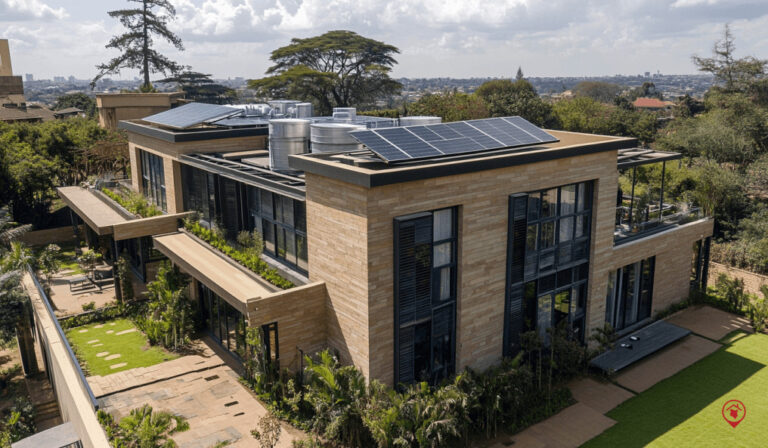Kenya’s Proposed Finance Bill 2025 Impact on The Real Estate Industry
1. Reintroduction of 16% VAT on Construction Materials
What’s changing?
The Finance Bill 2025 proposes to apply 16% VAT on construction materials that were previously VAT-exempt, especially those used in affordable housing projects.
Examples of affected items:
- Cement
- Steel
- Roofing materials
- Interior fittings and finishes
What it means:
Developers who were previously saving on VAT will now have to pay the full tax rate on inputs.
Impact on the housing sector:
- Higher construction costs, especially for low-cost housing projects
- Home prices may rise, making affordable housing less accessible
- Some developers may pause or scale down planned projects
2. Introduction of a 0.3% Annual Property Tax on Urban Residential Homes
What’s changing?
The Bill proposes a new national property tax of 0.3% per year on the market value of urban residential properties.
Example: A house worth Ksh 10 million would now attract Ksh 30,000 annually in property tax, on top of existing county land rates.
Why this matters:
- It’s a new national-level tax, adding to already existing county property charges.
Impact on the housing sector:
- Increased cost of owning or renting in cities like Nairobi, Mombasa, Kisumu, and Nakuru
- Landlords may increase rent to cover the new tax
- Middle-income homeowners may feel the financial pressure
3. Removal of Key Investment Incentives
a) Repeal of the 15% Corporate Tax Rate for Developers
What’s changing?
Developers who build 400 or more housing units per year currently enjoy a reduced corporate tax rate of 15% (instead of the usual 30%)
This incentive is being removed in the Finance Bill 2025.
Impact:
- Higher tax burden for large developers
- May discourage big affordable housing projects
- Could lead to fewer new units, affecting housing supply
b) Repeal of the 100% Investment Deduction for Certain Areas
What’s changing?
The Finance Bill 2025 proposes to repeal Section 24A of the Income Tax Act, which currently allows a 100% investment deduction for capital expenditures (like buildings, machinery, and infrastructure) on projects located in:
Special Economic Zones (SEZs)
Rural areas or regions with limited infrastructure, usually outside Nairobi and Mombasa
What was the benefit?
Under the current law:
If a company sets up a manufacturing plant, warehouse, or commercial building in an eligible area, it could deduct 100% of the project cost from its taxable income in the first year.
This meant major tax savings, especially for large developers, manufacturers, and agribusiness investors who chose to invest outside major urban centres.
What does repeal mean?
If the repeal goes through:
Developers and investors will no longer get the 100% tax deduction upfront for putting up infrastructure in SEZs or underserved areas.
These projects will now be treated like regular investments, subject to slower capital allowance deductions spread over several years.
Impact on Real Estate & Regional Development
Real estate developers may be discouraged from building in satellite towns or counties lacking basic infrastructure, since they’ll lose a key financial incentive.
Affordable housing and industrial parks in counties outside Nairobi may see reduced interest from investors.
Could slow down the government’s goal of decentralising development from Nairobi and Mombasa to other regions.
4. Limitation on Carrying Forward Tax Losses
What’s changing?
Businesses will now only be allowed to carry forward losses for 5 years, instead of indefinitely.
Why this matters:
- Many large-scale housing or infrastructure projects take years before becoming profitable.
- With this new rule, any losses older than 5 years can no longer be used to reduce tax liability.
Impact:
- Affects long-term investors, such as:
- Developers building entire estates
- PPP (public-private partnership) housing initiatives
- May reduce investment in capital-intensive projects
5. Changes to VAT Refunds and Offsets
What’s changing?
- The VAT refund window is being shortened from 3 years to 2 years.
- Developers will no longer be able to offset overpaid taxes against future input VAT.
- Refund audits may now take up to 180 days.
Why this matters:
- Many developers rely on VAT refunds to maintain cash flow.
- Delays or limitations in VAT recovery tie up capital.
Impact:
- Cash flow problems for developers, especially small and mid-sized firms
- May discourage contractors and suppliers from working with government-backed projects if refunds are delayed
6. Provisions in the National Rating Act 2024
What’s changing?
This proposed law expands county powers around property rates:
- More properties can now be rated (taxed), including formerly exempt categories.
- Counties must revalue properties every five years.
- They’re also allowed to take enforcement actions, including:
- Property auctions
- Penalties for non-payment
Why this matters:
- Introduces more frequent and possibly higher land rate bills
- Puts pressure on owners to stay compliant or risk losing property
Impact:
- Increased operational cost for real estate investors
- Raises compliance risks and investor uncertainty
- May discourage long-term property holding








